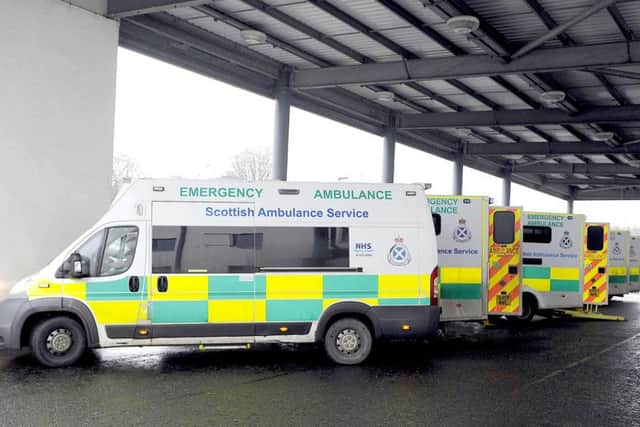Affluent elderly people in Scotland are 'putting pressure on A&E with demanding behaviour'
Figures revealed that 1,022 patients spent more than 12 hours in emergency departments in December 2019, compared to 148 in December 2018 - a 600 per cent increase.
Cuts to social care a decade ago have been blamed on placing increased pressure on A&E departments.
Advertisement
Hide AdAdvertisement
Hide AdScotland's largest health board axed the number of beds by nearly a fifth in 2019, and In the past decade, the number of beds in NHS Scotland has been cut by nearly one-fifth, from 25,751 to 20,791.


NHS Greater Glasgow and Clyde has reduced its bed numbers by 19.5 per cent, to 5,613 last year, but around 20 per cent of its hospital admissions are patients referred for specialist treatment or procedures from other health boards.
But the Scottish Government has said that more patients were seen within four hours in 2019, than since 2012.
Retired public health consultant Dr Helene Irvine cited her own research which pointed to "demanding" behaviour from wealthy OAPs demanding to be seen in emergency departments.
Dr Irvine said: "You have to bear that in mind when you're calculating your bed requirements.
"I think they probably don't have enough beds now based on how much work they're doing.
"You have all these elderly people from GGC, then you have all these extra people coming in from other health boards."
Compliance with the four-hour A&E target was consistently below 79 per cent for NHS GGC throughout December.
Advertisement
Hide AdAdvertisement
Hide AdFor Scotland as a whole, 3,405 patients spent more than eight hours in A&E in December 2019, compared to an average of 1,300 in the previous four Decembers, from 2015 to 2018.
The picture was even starker in relation to the numbers waiting more than 12 hours, which were 1,022 last month compared to an average of 242 for Decembers 2015-2018.
Dr Irvine, who retired from NHS Greater Glasgow and Clyde last year, said the deterioration in A&E performance dates back to 2010, when many councils responded to budget cuts by reducing funding for elderly social care.
However, her own research also shows that A&E dips are clearly linked to a spike in attendance by better-off, elderly patients.
She said: "In GGC and other parts of the west of Scotland, what I found was that in the weeks when we had very poor compliance with the four-hour, eight-hour or 12-hour A&E waiting times, we also had a spike in the 'elderly-affluent'.
"They come in, they're demanding, there isn't maybe that much wrong with them, but their children don't want to take them home and they're putting pressure on staff to admit them.
"A lot of time is spent to-ing and fro-ing in the A&E to decide what to do with them.
"That can easily end up being a four-hour, or an eight-hour or a 12-hour breach.
Advertisement
Hide AdAdvertisement
Hide Ad"This is one of the reasons I tell people not to get so hung up on A&E compliance.
"Invest in social care for the elderly, in general practice, in district nurses.
"What you need are community-based staff to deal with all this."
A Scottish Government spokesman said: "Scotland's core A&E departments continue to be the best performing in the UK and have been for more than four and a half years despite experiencing continued high attendance levels.
"In 2019, we have seen more patients within four hours than in any other year since 2012.
"We continue to work closely with those health boards facing the greatest challenges to minimise long delays and help drive improvements."
